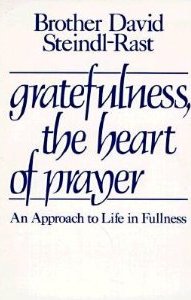A New Drug for Health and Happiness
(preached at Jericho Road Church, Nov. 18, 2012)
Did you know that the scientific community has been studying the
effects of gratitude on the physiological health of humans? Since
around the year 2000, social scientists began turning their focus
solely from abnormal psychology to healthy emotional habits and their
impact on the way we live.
Wikipedia
reports: “A large body of recent work suggests that people who are more
grateful have higher levels of well-being. Grateful people are happier,
less stressed, and more satisfied with their lives and social
relationship. Grateful people also have higher levels of control of
their environments, personal growth, purpose in life, and
self-acceptance. Grateful people have more positive ways of coping with
the difficulties they experience in life, being less likely to try and
avoid the problem, deny there is a problem, blame themselves, or cope
through substance use. Grateful people sleep better, and this seems to
be because they think less negative and more positive thoughts before
just going to sleep.”
Yet, even with this truth, even
with all the Scriptures that instruct us to give thanks, most of us
fall into the ungrateful-wretch category than that of a people whose
hearts are overflowing with appreciation—to God and to one another.
If
I told you that a new prescription drug had just come on the market—a
drug that had been trialed over the decades, and that scientists had
discovered that regular usage would enable the user to reach a state of
well-being—would you be interested?
Then if I went
even further and said that clinical trials had proven that the daily
use of this medicinal showed positive effects on mood
neurotransmitters, positive effects on reproductive hormones and on
social-bonding hormones, showed positive effects on cognitive and
pleasure-related neurotransmitters, on inflammatory and immune systems,
on stress hormones, on cardiac and EEG rhythms and on blood pressure as
well as blood sugar—wouldn’t you rush out and say, “Let me have some of
that stuff!”
If scientific studies have proved the positive impact of a lifestyle
attitude of gratitude, then we should all be working to develop
that kind of approach to living beginning today, shouldn’t we?
So
let’s begin. Dr. Dan Baker, director of behavioral medicine at the
National Center for Preventive and Stress Medicine, writes in his book
What Happy People Know, “Your mind, when focused on appreciating has an
unparalleled power to trigger physical and emotional healing.”
Understanding that it is hard for people in normally busy circumstances
but especially when experiencing trying events to focus the mind
positively, Baker has developed the “Appreciation Audit.”
Dr.
Baker cites studies that show the brain cannot process both fear (one
of mankind’s dominate negative emotions) and appreciation at the same
time. So the Appreciation Audit, when practiced, is designed to create
a shield in the brain against fear, hate and anger. He recommends that
learners start with a fundamental form of the Audit:
Reserve three minutes, preferably three times each day,
to think about something you appreciate.
Keep your mind focused until you feel the beauty of gratefulness rising.
This
practice is not a lot of effort, but it does require intentionality.
However, there is no better time to start that this season when our
minds are focused on a national thanksgiving holiday.
I love
it when the scientific community pats itself on the back for
discovering something that has already existed throughout the centuries
and been an essential practice of the Christian Church. All of these
studies and their results make me think of that pithy Scripture from
Proverbs, “Life and death are in the power of the tongue, and those who
love it will eat its fruit.” Proverbs 18:21.
When
I was a little girl, my mother told me, “Sticks and stones may break
your bones, but words will never harm you.” My mother was wrong. In
certain stormy and controversial passages of my life, I would much
rather have been hit with a stick than overwhelmed with the barrage of
wounding words that took us years and our ministry a decade to recover
from.
Not only was Mother wrong, she was
anti-scriptural, because Scripture is written out of a culture and a
time when people thought words had power. God spoke, for instance, and
the world was created. Christ cursed the barren fig tree, and it died.
He said, “Peace, be still” to the raging winds and pounding seas (think
of Hurricane Sandy), and the wind ceased and the waters were becalmed.
“Be clean” brought about instantaneous healing of leprosy. There is
power in words.
But
we Christians of this word-engorged 21st century don’t really believe
the Scripture. It must be metaphorical, illustrative. “Life and death
are in the power of the tongue…” We know we don’t believe when we
listen to the way our own mouths use words.
Scientists,
however—the social science community, the medical researchers, the
academy—are beginning to measure the impact of the word thanksgiving
and a lifestyle that results in the habit of living with appreciation.
An
Internet article titled “Three Big Benefits of Being Thankful Every
Day” quotes the work of researchers. Seth Borenstein, science writer
for the Associated Press, examines how being appreciative on a regular
basis can impact our lives. “Gratitude is literally one of the few
things that can measurably impact peoples’ lives.” According to the
studies:
1. Being Thankful Improves Your Health.
When a group of organ-transplant patients were asked to keep a daily
gratitude journal while another group simply wrote about the basic
details of their day, the group that regularly listed what they were
thankful for scored significantly higher on measures of both physical
and mental health.
2. Being Thankful Connects You With Other People.
Research from 2010 found that gratitude is also important in committed
relationships like marriage; 65 couples were studied and researchers
discovered that those who were most committed and satisfied
corresponded with couples who expressed gratitude with one another.
I
recently put myself out and volunteered to manage our small church’s
monthly potluck meal after our Sunday service. Since we meet in a
school gymnasium, for the most part, everything has to be hauled in,
set up, arranged, carted, then pulled apart, stacked and stored and
carried back to the car, unloaded, stored in basement shelves and in
attic corners. Frankly, this is a lot of work—most of the time taken
for granted because often the same people do this work—week after week.
However,
I was amazed that so many young adults (our church is mostly young
adults) thanked me for doing the potluck. There were at least eight
people who made a point of thanking me for organizing this event. I was
surprised! But I am on the list again for this month. It is amazing
what a word of appreciation (spoken eight times!) will do as far as my
feelings of serving Christ’s Body.
3. Being Thankful Can Change Your Attitude on Life.
I am basically a positive person, see the opportunities in life around
me, given a chance can be a catalyst for positive change in an
organization, see the glass as always half-full, am rarely discouraged,
and I identify the hand of God somewhere, no matter what has happened.
I am healthy and happy.
But I have not always been this way.
As a young woman in my 20s, I was prone to depression, saw the holes
(huge holes) in other people’s personalities, was given to judgment and
arrogance about my own abilities, and could easily look on the dark
side. Then for some reason, certainly the prompting of the Holy Spirit,
I set six months aside to write nothing but thanks in my prayer
journal. No requests, no lists of concerns. Just thanks. For six
months. The impact was overwhelmingly life-changing. I have kept a
daily record of my thanks ever since—for over four decades.
“Life and death are in the power of the tongue…”
I
have concluded that it is more than ill of us not to be practicing
thanksgiving; it is evil, a sin of neglect. And we are suffering from
this lack. Some of us, in this season of thanksgiving, need to be
asking for forgiveness from our Heavenly Father who has given us all
good gifts.
If you can start the fundamental
“Appreciation Audit” (3-5 minutes a day, three times a day), you may
want to listen to the hymn from the musical Godspell. (Go to YouTube and find Godspell: The New Broadway Musical.)
We plow the fields and scatter the good seed on the land…
But it is fed and watered by God’s almighty hand…
He sends us snow in winter, the warmth to swell the grain…
The breezes and the sunshine, and soft refreshing rain…
All good gifts around us
Are sent from Heaven above
So thank the Lord, oh thank the Lord for all his love…
Be happy. Be healthy. Give thanks.
 Welcome Basket by Our Front Door Welcome Basket by Our Front Door
Sign Reads: "Count Your Blessings"
Karen Mains
NOTES From KAREN
Report on NigeriaDavid
called from Amsterdam about 1:05 this morning (Nov. 20) to report that
his trip to Nigeria has been hugely successful, that God had brought
unusual opportunities to the filming crew, that everything had gone
better than they expected and that he was missing me and would be glad
to return home. “I think we will have a powerful finished video.”
By
the time this is published on the Internet, he should be safely home,
sleeping off jetlag and looking forward to celebrating Thanksgiving
with his gathered family.
Video and film shoots are most
often exhausting, hard work, and when done in the field (not to speak
of another country), fraught with high tension, frustration. This
situation demands endurance, the exercise of patience and the
controlling of stress. I count a successful and smooth shoot as the
answer to so many prayers, and I thank you for taking the time to hold
in your hearts my husband and his film team and our African brothers
and sisters involved in this project. Karen's Blogs for Next Week
Link is http://blog.karenmains.com/blog/thoughts-by-karen-mains.
Titles for next week are: “Prayers That Make an Extraordinary
Difference,” “Praying Scripture,” “Hours of Prayer,” “Fasting and
Prayer” and
“Prayer of Collaboration.”
Reminder!
The Soulish Food e-mails are
being
posted biweekly on the Hungry Souls Web
site. Newcomers can look that over and decide if they want to
register on the Web site to receive the biweekly newsletter. You might
want to recommend this to friends also. They can go to www.HungrySouls.org.
|
|

Karen Mains
“I have concluded that
it is more than ill of us not to be practicing thanksgiving; it is
evil, a sin of neglect. And we are suffering from this lack. Some of
us, in this season of thanksgiving, need to be asking for forgiveness
from our Heavenly Father who has given us all good gifts.”
BOOK CORNER

Gratefulness, the Heart of Prayer:
An Approach to Life in Fullness
by Brother David Steindl-Rast
I’m
amazed that I don’t have this book already on my spiritual-life
bookshelf. I’ve loved all the books I’ve read by David Steindl-Rast, a
noted Benedictine monk. Every year at Advent, I re-read Music of Silence,
which reminds me of the kind of spiritual rhythm I want to establish
and since the season of Advent is the beginning of the church calendar
year, this seems like a perfect beginning, although not a new one.
Since Gratefulness, the Heart of Prayer
fits perfectly with this theme of thanksgiving, I’ve ordered it from
Amazon.com and have no qualms of recommending the book to you (even
unread but soon not to be) by me.
Buy From Amazon.com
|


